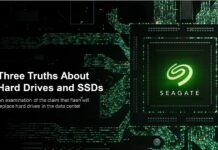The latest IBM FlashSystem 5300 array has a PCIe 4 bus, computational drives, and Ice Lake CPUs, accompanied by a Storage Assure scheme to upgrade hardware and software during the life of a system.
Similar to Pure’s 2015 Evergreen program, Storage Assurance is a customer subscription with regular drive and controller hardware and software refreshes plus premium-level Expert Care support to keep storage infrastructure up to date without downtime, disruptive migrations, and recurring purchases. It works with the FlashSystem 5300, 7300, and 9500 but not the non-NVMe drive 5015 and 5045 arrays.
Denis Kennelly, IBM Storage General Manager, said: ”IBM Storage Assurance challenges the status quo of enterprise storage with a program that delivers client focused guarantees, computational storage with AI-powered data services, and an all-inclusive software integration designed to address customers’ most pressing problems, including a path for them to adopt future innovations from IBM.”
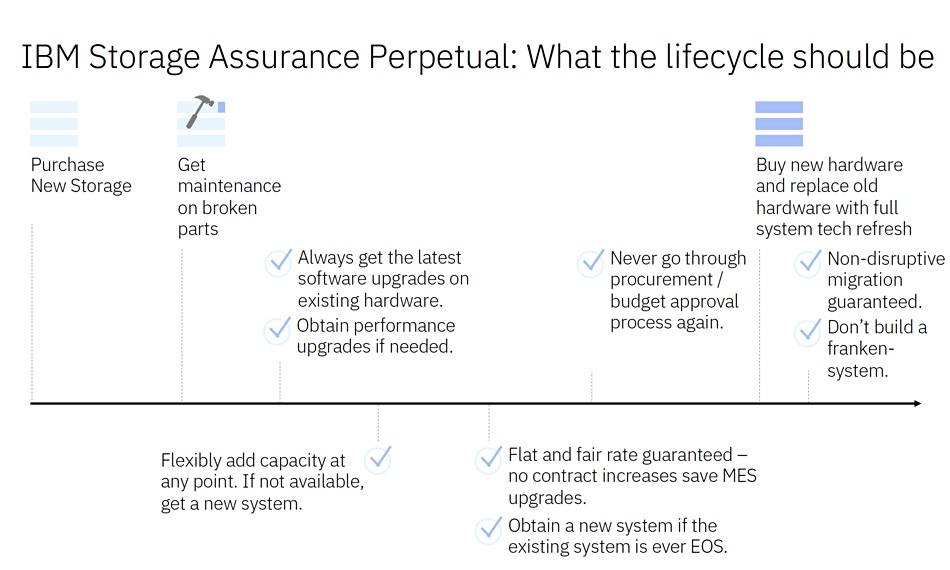
The Storage Assurance hardware and software upgrades are covered by SLAs and a flat pricing contract with four and eight-year terms. Clients can easily increase capacity by adding as few as just one additional drive at a time. Customers can receive a trade-in credit for out-of-cycle upgrades.
FlashSystem 5300
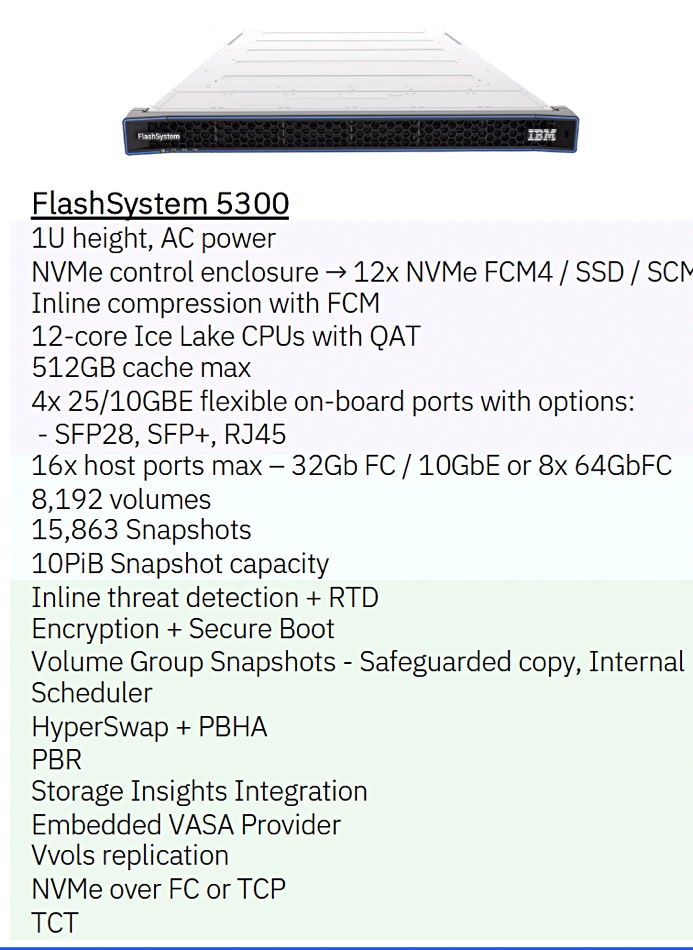
IBM says its latest FlashSystem array has a number of enhancements, including the latest gen 4 FlashCore Modules (FCMs), IBM’s proprietary flash drives with computational storage. This means onboard compression and encryption, and firmware-based real-time detection of ransomware and other attacks using machine learning. The vendor claims FCM 4s keep detailed statistics about every IO in real time, and the firmware uses machine learning models to distinguish ransomware and malware from normal behavior.
The FCMs use 176-layer TLC NAND chips and have 4.8, 9.6, 19.2 and 38.4 TB capacities. The built-in compression increases effective capacity by up to 2.3 times, meaning 14.4, 28.8, 57.6, and 115 TB capacities respectively. A FlashSystem 5300 with 12 gen 4 FCM drives can have 1 PB or more of effective capacity.
The 5300 comes in a 1RU chassis and uses a PCIe gen 4 bus, twice as fast as the PCIe gen 3 bus used in the 2RU FlashSystem 5200 array, which it supersedes. It accompanies the higher-end 7300 and 9500 FlashSystems. The 5300 supports 2 x 4-port 32 Gbps Fibre Channel HBAs or 2 x 2-port 64 Gbps HBAs. There are onboard 10/25 GbE ports for IO and replication without consuming an HBA slot.
The 5300’s 400,000 IOPS and 28 Gbps bandwidth are 1.45x and 1.3x greater respectively than the 5200’s performance in half the physical size.
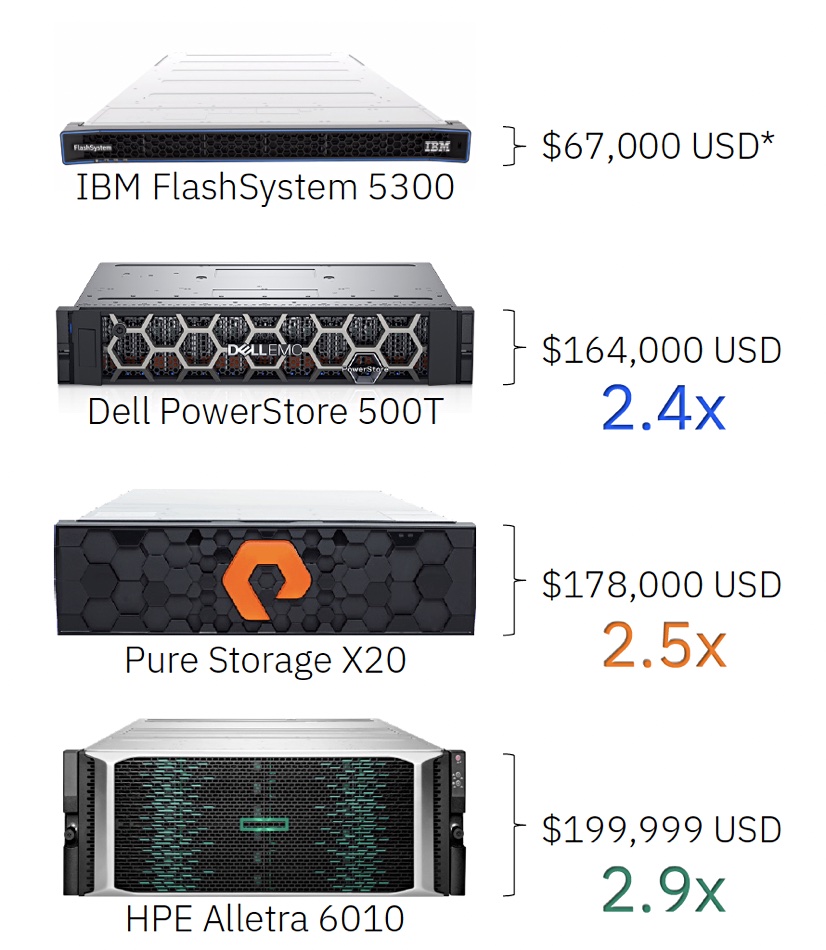
Using data from an IBM TechXchange community presentation (login required), we see that the 5300 has a $67,000 base price. Dell’s PowerStore 500T, Pure Storage FlashArray//X20, and HPE Alletra 6010 are 2.4 to 2.9 times more expensive, based on IDC pricing data.
This presentation has a neat competitive comparison table for you to inspect:
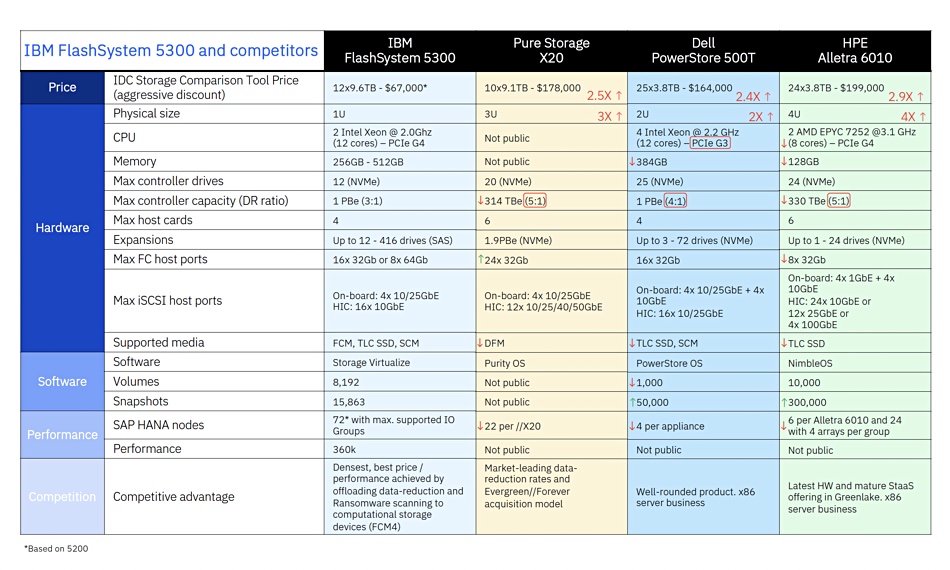
Flash Grid
Today’s Big Blue news blast also has Flash Grid technology and Policy-Based High Availability aspects. Flash Grid enables customers to manage storage systems as a highly available and independently scalable environment, from a single control pane, with the ability to move workloads between FlashSystems.
Customers can aggregate IBM FlashSystem devices and manage them as a single scalable storage grid, with high-availability, replication, and non-disruptive app data migrations. They can use AIOps and AI-powered workload simulation to determine the best placement for workloads on the Flash Grid.
FlashSystem policy-based replication and high availability for disaster recovery enables the system to automatically deploy and manage replication between two systems with minimal overhead, higher throughput, and lower latency.
Later this year IBM intends to extend this with with replication to a third system, and simplify the tasks associated with configuring, managing, and monitoring replication.
IBM’s Storage Assurance program and the FlashSystem 5300 are now generally available. Learn more about IBM Storage Assurance here and the IBM FlashSystem 5300 here.






